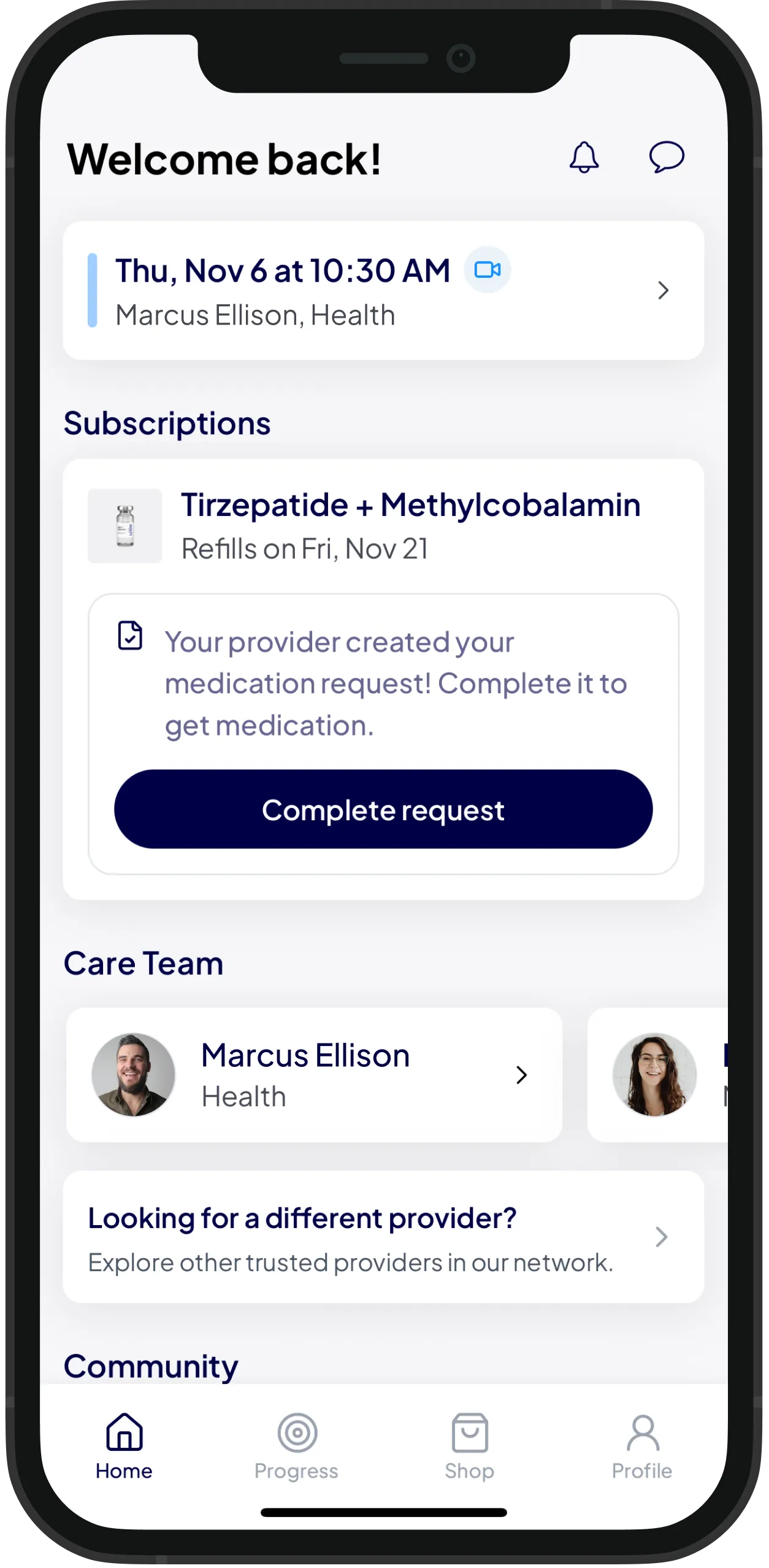Ready to transform your health?
Unlock access to expert guidance and a weight care plan crafted just for you.
Ready to transform your health?
Unlock access to expert guidance and a weight care plan crafted just for you.
Similar Articles
Similar Articles


GLP-1s for Pre-diabetes: Can You Prevent Type II Diabetes?
GLP-1s for Pre-diabetes: Can You Prevent Type II Diabetes?


Is Long-Term GLP-1 Use Safe? What 10-Year Data Suggests
Is Long-Term GLP-1 Use Safe? What 10-Year Data Suggests


GLP 1s and Cardiometabolic Health: How These Medications Support the Heart and Long Term Wellness
GLP 1s and Cardiometabolic Health: How These Medications Support the Heart and Long Term Wellness
Compounded medication
Compounded medication
Compounded medication
Updated on
Updated on
Updated on
Feb 19, 2026
Feb 19, 2026
Feb 19, 2026
Can GLP-1 Medications Help With Psoriasis?
Can GLP-1 Medications Help With Psoriasis?
Can GLP-1 Medications Help With Psoriasis?
Studies on GLP-1 agonist for the treatment of psoriasis show great promise and may be especially useful in the type 2 diabetic population
Studies on GLP-1 agonist for the treatment of psoriasis show great promise and may be especially useful in the type 2 diabetic population
Studies on GLP-1 agonist for the treatment of psoriasis show great promise and may be especially useful in the type 2 diabetic population



Table of Contents
Table of Contents
Table of Contents
What is psoriasis?
Background on GLP-1 Medications
Research on GLP-1s and Psoriasis
Final Thoughts
What is psoriasis?
Background on GLP-1 Medications
Research on GLP-1s and Psoriasis
Final Thoughts
What is psoriasis?
Background on GLP-1 Medications
Research on GLP-1s and Psoriasis
Final Thoughts
What is psoriasis?
Psoriasis is a chronic inflammatory condition that affects millions of people worldwide. It is characterized by the rapid growth of skin cells, which leads to the formation of red, scaly patches on the skin. While there are several treatment options available for psoriasis, including topical creams, oral medications, and biologic agents, a new class of medications called GLP-1 agonists has recently emerged as a promising treatment option for psoriasis in patients who also have type 2 diabetes and/or obesity.

Background on GLP-1 Medications
GLP-1 agonists are a type of medication that is commonly used to treat type 2 diabetes. They work by mimicking the effects of a hormone called glucagon-like peptide-1 (GLP-1), which is produced naturally by the body in response to food intake. GLP-1 agonists help to regulate blood sugar levels by stimulating the release of insulin and suppressing the release of glucagon, another hormone that raises blood sugar levels. These medications have also been approved for medication-assisted weight loss in patients with obesity.
Research on GLP-1’s and Psoriasis
Recent research has shown that GLP-1 agonists may also have anti-inflammatory effects, which could make them an effective treatment option for psoriasis. In one study, researchers found that patients with type 2 diabetes and psoriasis had statistically significant improvement of their skin lesions after taking the GLP-1 medication, liraglutide, for 12 weeks (1). These patients also had statistically significant improvements in their hemoglobin A1c, waist circumference, and BMI. Another study was done in 2022 that reviewed a large pool of evidence on the efficacy of liraglutide on plaque psoriasis and found that, in 32 patients total, there was a statistically significant improvement of their PASI (Psoriasis Area and Severity Index) scores (2). Interestingly, in this study, they did not report a significant change in patients’ weight or blood sugar control, suggesting that the mechanism by which psoriasis is improved may be independent from the GLP-1 medication’s mechanism of action for type 2 diabetes.
The exact mechanism by which GLP-1 agonists improve psoriasis symptoms is not yet fully understood. However, it is believed that these medications may work by reducing inflammation in the body, which is a key factor in the development of psoriasis. GLP-1 agonists may also help to regulate the immune system, which is known to play a role in the development of psoriasis.
While GLP-1 agonists show promise as a treatment option for psoriasis, more research is needed to determine their effectiveness and safety. Currently, GLP-1 agonists are not approved by the US Food and Drug Administration (FDA) for the treatment of psoriasis, and they should not be used for this purpose without the guidance of a healthcare provider.
Final Thoughts
To wrap up, GLP-1 agonists are a promising new class of medications that may offer an effective treatment option for psoriasis, and may be especially useful for people with type 2 diabetes and/or obesity. These medications have shown potential in reducing psoriasis symptoms and improving quality of life for those living with this chronic condition. As always, it is important to work closely with a healthcare provider to determine the best treatment plan for psoriasis. While medication is a powerful tool, focusing on daily wellness can further support your body's response. You can explore these 10 habits that improve GLP-1 results to maximize your health journey without needing to increase your dose. If you would like to learn more about GLP-1 medications or want to see if you might be eligible for medication-assisted weight loss, check out Mochi Health, where board-certified obesity medicine physicians can offer expertise in this realm!
This post was written by our team of health writers for informational purposes only and does not constitute medical advice. Always consult your doctor or healthcare provider for personalized guidance regarding your health. Ozempic®, Wegovy®, Mounjaro®, and Zepbound® and their delivery device are registered trademarks. Mochi Health is a telehealth clinic that offers prescriptions for these products by medical necessity only as determined by a licensed health provider.
Sources
Xu X, Lin L, Chen P, et al. Treatment with liraglutide, a glucagon-like peptide-1 analogue, improves effectively the skin lesions of psoriasis patients with type 2 diabetes: A prospective cohort study. Diabetes Res Clin Pract. 2019;150:167-173. doi:10.1016/j.diabres.2019.03.002
Chang G, Chen B, Zhang L. Efficacy of GLP-1rA, liraglutide, in plaque psoriasis treatment with type 2 diabetes: a systematic review and meta-analysis of prospective cohort and before-after studies. J Dermatolog Treat. 2022;33(3):1299-1305. doi:10.1080/09546634.2021.1882658
What is psoriasis?
Psoriasis is a chronic inflammatory condition that affects millions of people worldwide. It is characterized by the rapid growth of skin cells, which leads to the formation of red, scaly patches on the skin. While there are several treatment options available for psoriasis, including topical creams, oral medications, and biologic agents, a new class of medications called GLP-1 agonists has recently emerged as a promising treatment option for psoriasis in patients who also have type 2 diabetes and/or obesity.

Background on GLP-1 Medications
GLP-1 agonists are a type of medication that is commonly used to treat type 2 diabetes. They work by mimicking the effects of a hormone called glucagon-like peptide-1 (GLP-1), which is produced naturally by the body in response to food intake. GLP-1 agonists help to regulate blood sugar levels by stimulating the release of insulin and suppressing the release of glucagon, another hormone that raises blood sugar levels. These medications have also been approved for medication-assisted weight loss in patients with obesity.
Research on GLP-1’s and Psoriasis
Recent research has shown that GLP-1 agonists may also have anti-inflammatory effects, which could make them an effective treatment option for psoriasis. In one study, researchers found that patients with type 2 diabetes and psoriasis had statistically significant improvement of their skin lesions after taking the GLP-1 medication, liraglutide, for 12 weeks (1). These patients also had statistically significant improvements in their hemoglobin A1c, waist circumference, and BMI. Another study was done in 2022 that reviewed a large pool of evidence on the efficacy of liraglutide on plaque psoriasis and found that, in 32 patients total, there was a statistically significant improvement of their PASI (Psoriasis Area and Severity Index) scores (2). Interestingly, in this study, they did not report a significant change in patients’ weight or blood sugar control, suggesting that the mechanism by which psoriasis is improved may be independent from the GLP-1 medication’s mechanism of action for type 2 diabetes.
The exact mechanism by which GLP-1 agonists improve psoriasis symptoms is not yet fully understood. However, it is believed that these medications may work by reducing inflammation in the body, which is a key factor in the development of psoriasis. GLP-1 agonists may also help to regulate the immune system, which is known to play a role in the development of psoriasis.
While GLP-1 agonists show promise as a treatment option for psoriasis, more research is needed to determine their effectiveness and safety. Currently, GLP-1 agonists are not approved by the US Food and Drug Administration (FDA) for the treatment of psoriasis, and they should not be used for this purpose without the guidance of a healthcare provider.
Final Thoughts
To wrap up, GLP-1 agonists are a promising new class of medications that may offer an effective treatment option for psoriasis, and may be especially useful for people with type 2 diabetes and/or obesity. These medications have shown potential in reducing psoriasis symptoms and improving quality of life for those living with this chronic condition. As always, it is important to work closely with a healthcare provider to determine the best treatment plan for psoriasis. While medication is a powerful tool, focusing on daily wellness can further support your body's response. You can explore these 10 habits that improve GLP-1 results to maximize your health journey without needing to increase your dose. If you would like to learn more about GLP-1 medications or want to see if you might be eligible for medication-assisted weight loss, check out Mochi Health, where board-certified obesity medicine physicians can offer expertise in this realm!
This post was written by our team of health writers for informational purposes only and does not constitute medical advice. Always consult your doctor or healthcare provider for personalized guidance regarding your health. Ozempic®, Wegovy®, Mounjaro®, and Zepbound® and their delivery device are registered trademarks. Mochi Health is a telehealth clinic that offers prescriptions for these products by medical necessity only as determined by a licensed health provider.
Sources
Xu X, Lin L, Chen P, et al. Treatment with liraglutide, a glucagon-like peptide-1 analogue, improves effectively the skin lesions of psoriasis patients with type 2 diabetes: A prospective cohort study. Diabetes Res Clin Pract. 2019;150:167-173. doi:10.1016/j.diabres.2019.03.002
Chang G, Chen B, Zhang L. Efficacy of GLP-1rA, liraglutide, in plaque psoriasis treatment with type 2 diabetes: a systematic review and meta-analysis of prospective cohort and before-after studies. J Dermatolog Treat. 2022;33(3):1299-1305. doi:10.1080/09546634.2021.1882658
What is psoriasis?
Psoriasis is a chronic inflammatory condition that affects millions of people worldwide. It is characterized by the rapid growth of skin cells, which leads to the formation of red, scaly patches on the skin. While there are several treatment options available for psoriasis, including topical creams, oral medications, and biologic agents, a new class of medications called GLP-1 agonists has recently emerged as a promising treatment option for psoriasis in patients who also have type 2 diabetes and/or obesity.

Background on GLP-1 Medications
GLP-1 agonists are a type of medication that is commonly used to treat type 2 diabetes. They work by mimicking the effects of a hormone called glucagon-like peptide-1 (GLP-1), which is produced naturally by the body in response to food intake. GLP-1 agonists help to regulate blood sugar levels by stimulating the release of insulin and suppressing the release of glucagon, another hormone that raises blood sugar levels. These medications have also been approved for medication-assisted weight loss in patients with obesity.
Research on GLP-1’s and Psoriasis
Recent research has shown that GLP-1 agonists may also have anti-inflammatory effects, which could make them an effective treatment option for psoriasis. In one study, researchers found that patients with type 2 diabetes and psoriasis had statistically significant improvement of their skin lesions after taking the GLP-1 medication, liraglutide, for 12 weeks (1). These patients also had statistically significant improvements in their hemoglobin A1c, waist circumference, and BMI. Another study was done in 2022 that reviewed a large pool of evidence on the efficacy of liraglutide on plaque psoriasis and found that, in 32 patients total, there was a statistically significant improvement of their PASI (Psoriasis Area and Severity Index) scores (2). Interestingly, in this study, they did not report a significant change in patients’ weight or blood sugar control, suggesting that the mechanism by which psoriasis is improved may be independent from the GLP-1 medication’s mechanism of action for type 2 diabetes.
The exact mechanism by which GLP-1 agonists improve psoriasis symptoms is not yet fully understood. However, it is believed that these medications may work by reducing inflammation in the body, which is a key factor in the development of psoriasis. GLP-1 agonists may also help to regulate the immune system, which is known to play a role in the development of psoriasis.
While GLP-1 agonists show promise as a treatment option for psoriasis, more research is needed to determine their effectiveness and safety. Currently, GLP-1 agonists are not approved by the US Food and Drug Administration (FDA) for the treatment of psoriasis, and they should not be used for this purpose without the guidance of a healthcare provider.
Final Thoughts
To wrap up, GLP-1 agonists are a promising new class of medications that may offer an effective treatment option for psoriasis, and may be especially useful for people with type 2 diabetes and/or obesity. These medications have shown potential in reducing psoriasis symptoms and improving quality of life for those living with this chronic condition. As always, it is important to work closely with a healthcare provider to determine the best treatment plan for psoriasis. While medication is a powerful tool, focusing on daily wellness can further support your body's response. You can explore these 10 habits that improve GLP-1 results to maximize your health journey without needing to increase your dose. If you would like to learn more about GLP-1 medications or want to see if you might be eligible for medication-assisted weight loss, check out Mochi Health, where board-certified obesity medicine physicians can offer expertise in this realm!
This post was written by our team of health writers for informational purposes only and does not constitute medical advice. Always consult your doctor or healthcare provider for personalized guidance regarding your health. Ozempic®, Wegovy®, Mounjaro®, and Zepbound® and their delivery device are registered trademarks. Mochi Health is a telehealth clinic that offers prescriptions for these products by medical necessity only as determined by a licensed health provider.
Sources
Xu X, Lin L, Chen P, et al. Treatment with liraglutide, a glucagon-like peptide-1 analogue, improves effectively the skin lesions of psoriasis patients with type 2 diabetes: A prospective cohort study. Diabetes Res Clin Pract. 2019;150:167-173. doi:10.1016/j.diabres.2019.03.002
Chang G, Chen B, Zhang L. Efficacy of GLP-1rA, liraglutide, in plaque psoriasis treatment with type 2 diabetes: a systematic review and meta-analysis of prospective cohort and before-after studies. J Dermatolog Treat. 2022;33(3):1299-1305. doi:10.1080/09546634.2021.1882658
Read next
Ready to transform your health?
Unlock access to expert guidance and a weight care plan crafted just for you.

Ready to transform your health?
Unlock access to expert guidance and a weight care plan crafted just for you.

Ready to transform your health?
Unlock access to expert guidance and a weight care plan crafted just for you.


© 2026 Mochi Health
All professional medical services are provided by licensed physicians and clinicians affiliated with independently owned and operated professional practices. Mochi Health Corp. provides administrative and technology services to affiliated medical practices it supports, and does not provide any professional medical services itself.


© 2026 Mochi Health
All professional medical services are provided by licensed physicians and clinicians affiliated with independently owned and operated professional practices. Mochi Health Corp. provides administrative and technology services to affiliated medical practices it supports, and does not provide any professional medical services itself.


© 2026 Mochi Health
All professional medical services are provided by licensed physicians and clinicians affiliated with independently owned and operated professional practices. Mochi Health Corp. provides administrative and technology services to affiliated medical practices it supports, and does not provide any professional medical services itself.
















